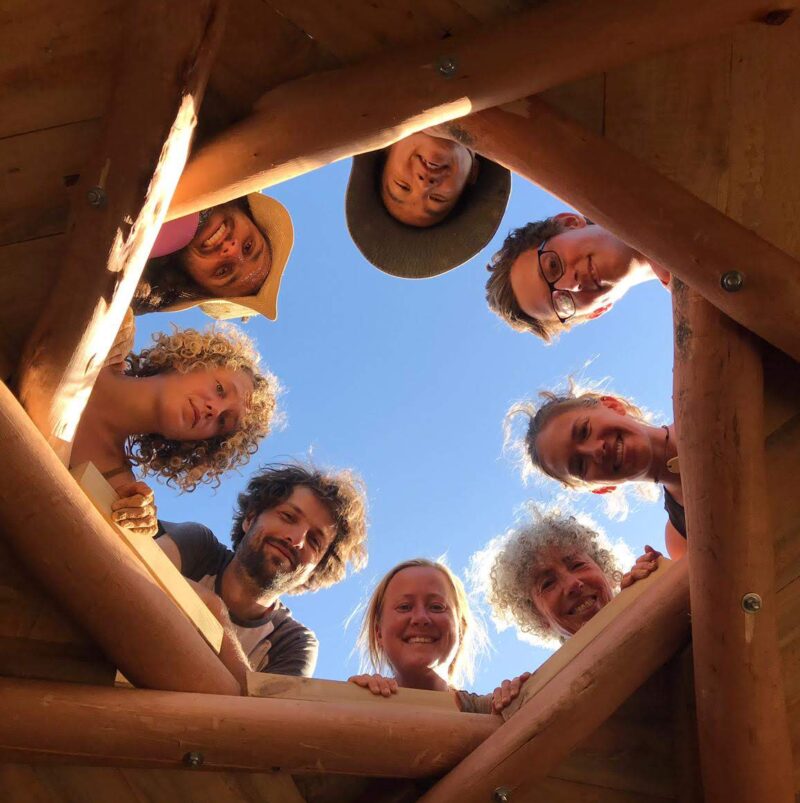Natural Building Certificate
Natural Building Certificate Workshops
Our Natural Building Certificates will be awarded for attending one of our 2-5 week Natural Building Certificate Workshops. You will get opportunity to study and build with natural building materials and green technologies hands-on. Understanding the climate and environment of the building site is essential to designing a building that is appropriate for it. In times of a climate crisis it is particularly important to us to teach you about embodied carbon. Namely how to keep it as low as possible in your building. After this workshop you will know how to build unique, eco friendly, resilient, long lasting structures with local and abundantly available materials. From foundation to roof, including planning, sculpting, plastering, electricity and plumbing inside the walls, you will learn how to build a house, by doing it.
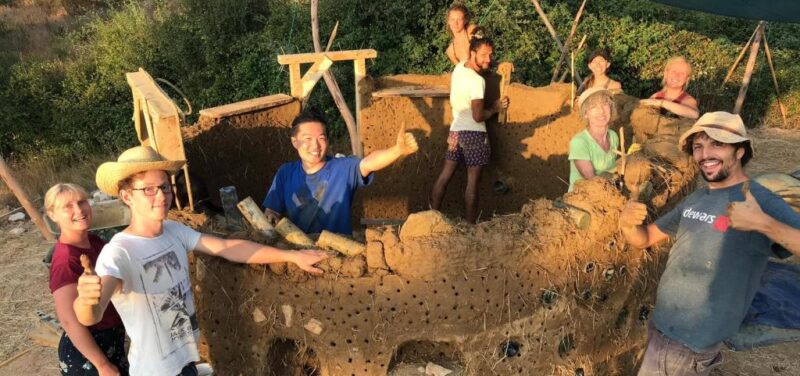
Natural Building students during a workshop in Portugal
The Natural Building Certificate Workshops are an Introduction to Natural Building techniques and green building technologies. This includes hands-on practice with natural rock foundations, insulative as well as thermally massive wall systems, earthen floors and plasters as well as natural paints and finishes. Depending on the host’s project, workshops can include extras, such as green roofs, reciprocal roofs, green houses and others. In a Master Natural Building Certificate Workshop you will get 175 hours of practical experience plus 25 hours of lectures. That is an intensive 200 hours course, that will change how you think about living spaces.
Who is a Natural Building Certificate for?
Our Natural Building Certificate is for everyone who wants to know what alternatives to conventional building technologies are out there. Whether you are environmentally conscious and want to reduce your carbon footprint, or surround yourself with healthy natural walls. Whether you want to build cheap by doing everything yourself, or because you want a hand-sculpted house reflecting your creativity. Natural Buildings can give you all of that. Our students come from all over the world. Whether man or woman, young or old, Natural Building is for everyone. With the knowledge from this course you can get started building your own home or become a professional Natural Builder.
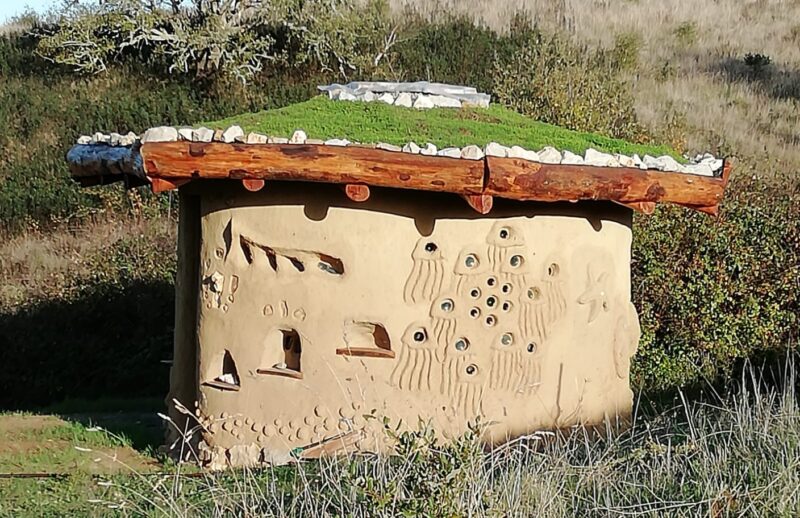
Cob cabin ‘TerrAqua’, built in a Natural Building Workshop in Portugal
Please consider that this course will be physically demanding, as we are building a whole house bare-handed and -footed. If you are not able to do hard work please let us know before the workshop, so we can arrange other task for you.
Natural Builder Certification
You will receive a Natural Builder Certificate, all the teaching materials by email, as well as the permaskills – Natural Builder’s Handbook, which is a summary of the workshop building steps, upon graduation.
Course Schedule
Our Natural Building Certificate Workshops usually begin on Sunday afternoons at 4 pm with an Opening Circle and Introduction to Site & Project, the Welcome Dinner and Introduction to the Workshop. They end on Saturdays, around 2 pm after the Graduation ceremony, Closing Circle & Lunch.
You can arrive a day or two before to settle in, but food and our chef’s services will only be provided from Sunday evening.
Overall Schedule
| Timeframe | Focus On |
|---|---|
| Sun. 4 pm | Opening Circle, Welcome Dinner, Introduction |
| week 1 | Lectures: Ground Assessment Materials and soil analysis Passive solar, placement and orientation Foundation & drainage Earthen floors and insulation Practice: Natural rock stem wall & foundation Drainage Plumbing (drains for sink, shower, toilet) Floor insulation and earthen subfloor |
| week 2 | Lectures: Timber Framing with round wood Wood connections Window & Door Frames Power & hand tool instruction Practice: Wooden frame and roof Window & Door Frames Live Edge Shelves |
| week 3 | Lectures: Natural wall systems Cob / floor / plaster mixture and calculation Wall insertions Electrical conduits & plumbing Natural Building Design Building to code Practice: Cob / Adobe / Rammed Earth walls Niches, arches, shelves, bottle bricks, and other wall insertions Electrical conduits and outlets |
| week 4 | Lectures: Strawbale and Light-Straw-Clay walls Roof types and covers Natural plasters Practice: Roof connection to wall Sculpting with Cob First and second layer of plaster Second floor layer |
| week 5 | Lectures: Natural finishes and paints (clay, lime, oil, wax, tadelakt, pigments) Cost analysis and planning Project specific extras like green roof, heater, green house, custom doors or windows, etc. Practice: Roof cover Natural finishes and paints Project specific extras Small scale models of future projects, time permitting |
| Sat 10 am | Closing Circle |
In addition to the lectures, slideshows and videos will be shown to support and enhance your understanding of materials, building, design, geography, budgeting, project management, business options and legal issues.
Weekly Schedule
| Timeframe | Focus On |
|---|---|
| Mon – Fri | all-day hands-on class |
| Mon, Wed, Fri | 60 min lecture after Lunch & Rest time |
| Sat | morning hands-on (optional), afternoon off |
| Sun | all-day off |
Saturday mornings are optional buffers, should we fall behind in schedule. Saturday afternoons and Sundays are off to explore the region further and stay somewhere over night.
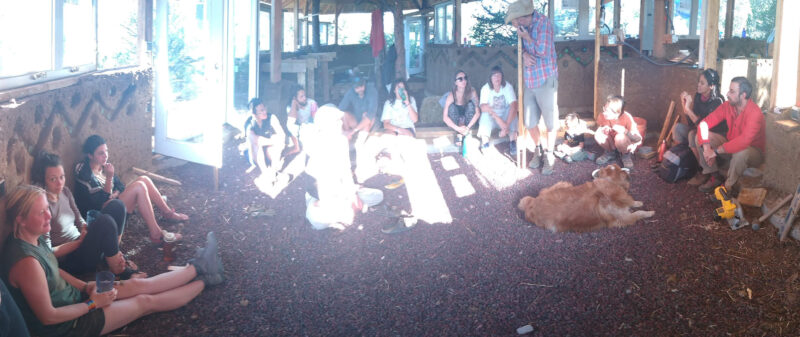
a morning circle, kids and dogs welcome 🙂
Daily Schedule
| Timeframe | Focus On |
|---|---|
| 6:30-7:30 | Meditation/Yoga (voluntary) |
| 7:30-8:30 | Breakfast |
| 8:45-1:00 | Class |
| 1:00-2:30 | Lunch |
| 2:30-5:30 | Class |
| 5:30-7:00 | Rest/Yoga |
| 7:00-8:00 | Dinner |
| 8:00-9:00 | Slides / Videos/Discussion (once a week) |
There is often someone who leads yoga or some other movement practice in the morning and/or the afternoon. We like to have one evening a week to show slides, videos or have workshop related debates. The rest of the time you can spend on your own, join a jam session around the fire or contribute something to share with the group.
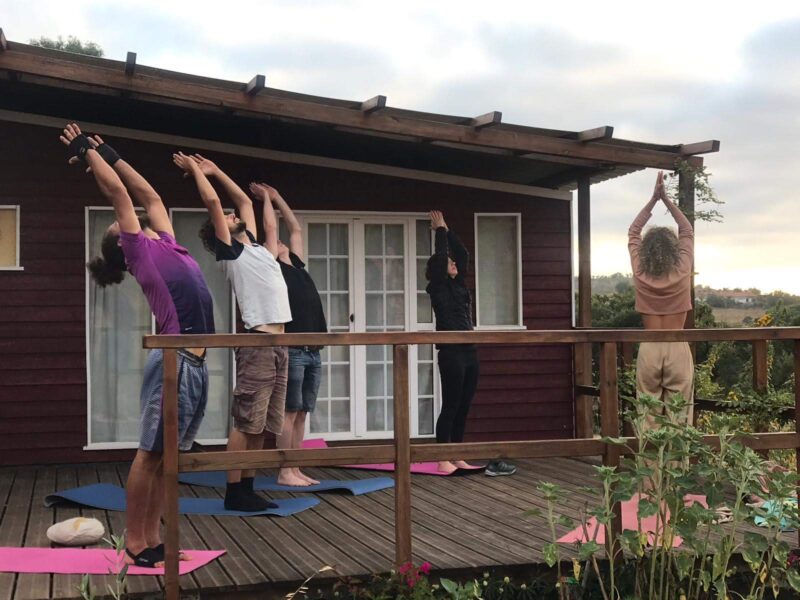
a voluntary morning yoga session
Workshop Requirements
There are no skill requirements for the Natural Building Certificate Workshop! That said, it certainly won’t hurt if you know some things and put it to good use or share it with others. Nobody is perfect and we are always curious to learn other ways of doing things.
Please bring an open mind and be prepared to do some demanding physical work from Day 1.
Essentials to bring
Good to have
In short, bring whatever you NEED to be comfortable and happy when camping for over a month. 
Optional: if you like to bring your own tools
Be prepared
Please read “The Natural Building Companion, Ace McArleton, Jacob Deva Racusin” (all in one, quite technical) or “The Handsculpted House, Ianto Evans, Michael G. Smith, Linda Smiley” (cob, inspirational) before arrival, you won’t have much time to read them during the workshop. Watch some videos on YouTube about natural building and browse our gallery to get an idea of what to expect from the workshop. Please bring your book(s) and any other books or poems to share as well as slideshows, videos, movies, and downloaded building site music playlists!!!
Take care of yourself
Make sure to take care of your personal needs, drink a lot of water, rest when needed and exert yourself at a steady pace. Let us know if you cannot do hard physical work before the workshop begins, so we can adjust accordingly. It is totally OK to come for the lecture/theory part, and then help the building part in less physically demanding ways, for example cutting straw, sifting for plaster, hammering nails into frames or shelves, sculpting, plastering, cutting bottles. There is a lot to do besides making and building!
Share what you are good at
If you are a qualified teacher or leader in something beneficial to our month-long time together, and would like to offer it up, please don’t hesitate to speak to the Instructors before or during the Workshop! We are open to non-building activities in the evenings and at night…if the energy is there of course.
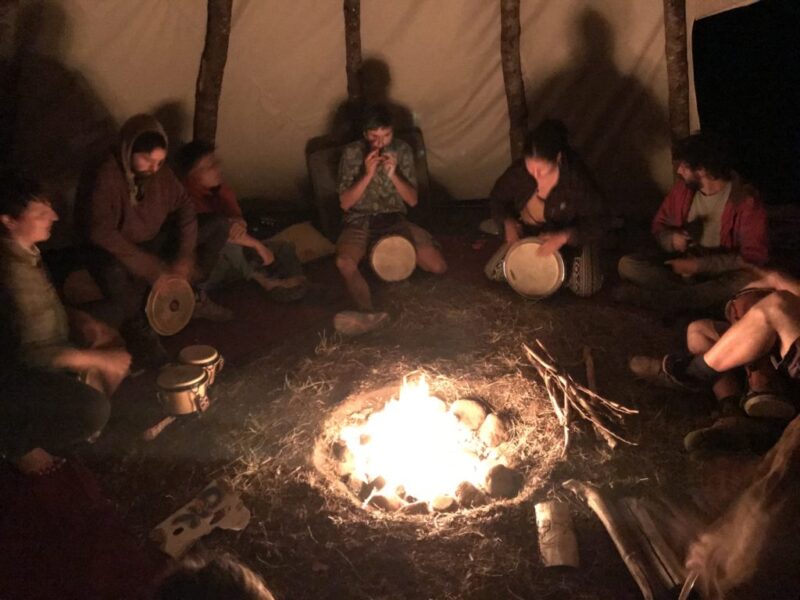
Drum session with student Clemente
Important Information
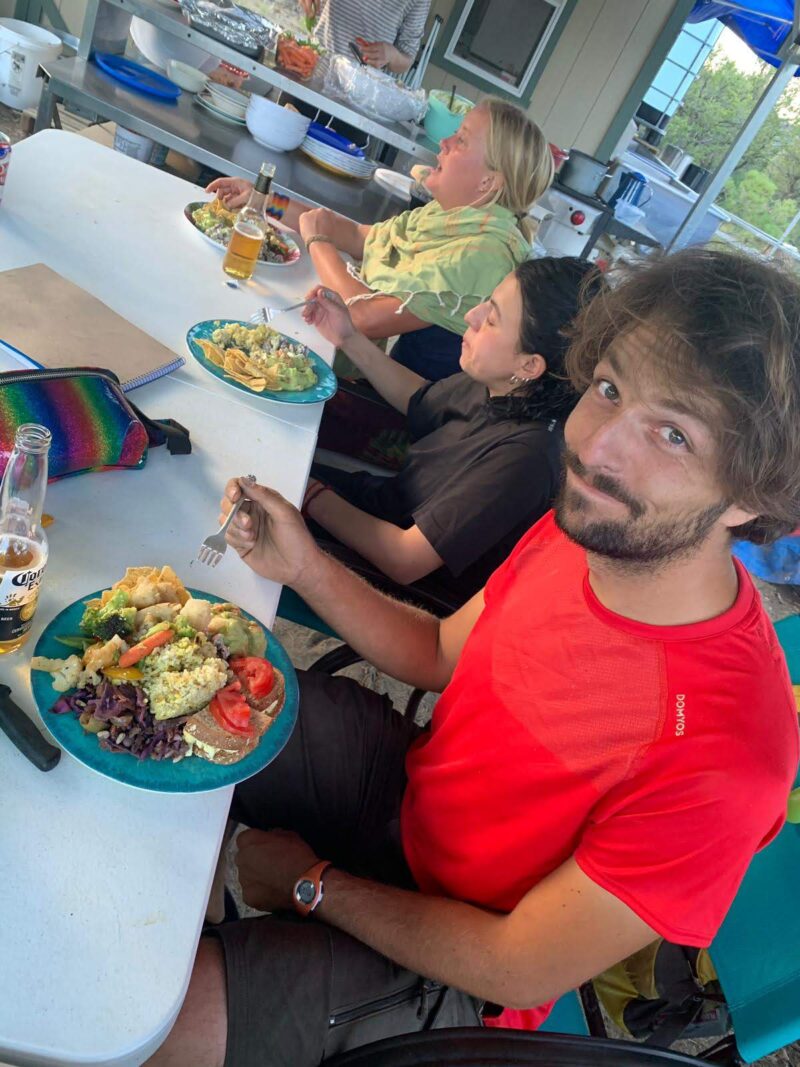
Robert enjoying one of the amazing meals at our workshops
Meals
You will be fed 3 delicious meals a day during the weekdays, prepared by experienced cooks. Suski workshop hosts always serve amazing food to students in gratitude for their hard work! We will be providing mainly ovo-lacto-vegetarian food. Therefore we can be sustainable and meet most culinary tastes. Depending on student’s needs we could have fish, meat or vegan options however. We will try to meet people’s requirements, so make sure to communicate them as soon as possible. On weekends, food will be available on site for you to prepare.
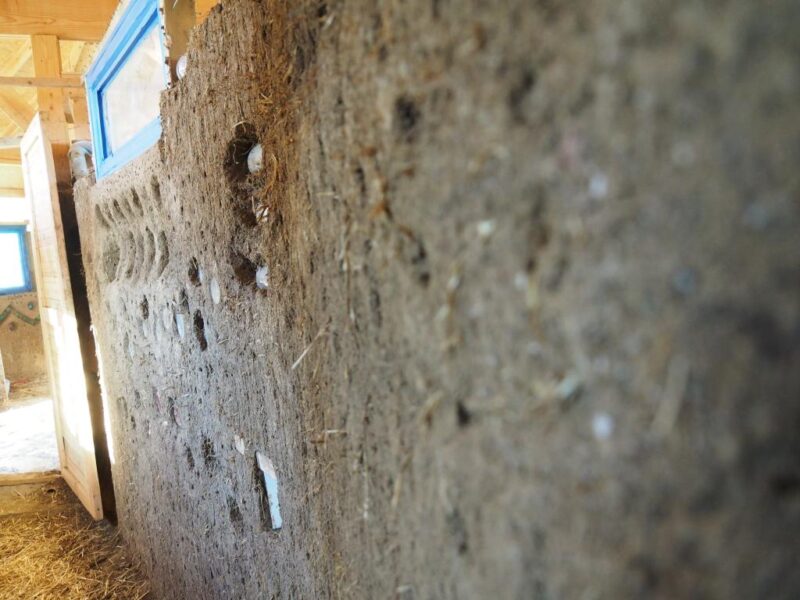
trimmed cob wall
Accommodations
In most of our Workshop venues you will be camping. Compost toilets, hot and cold showers, a dining area, yoga/dance space and a cozy hangout communal area with fire circle will be offered for maximum comfort and enjoyment. We want you to have a wonderful and transformative time together.
Sometimes there are rooms available for extra comfort, but they are not included in the fee for the Natural Building Certificate Workshop.
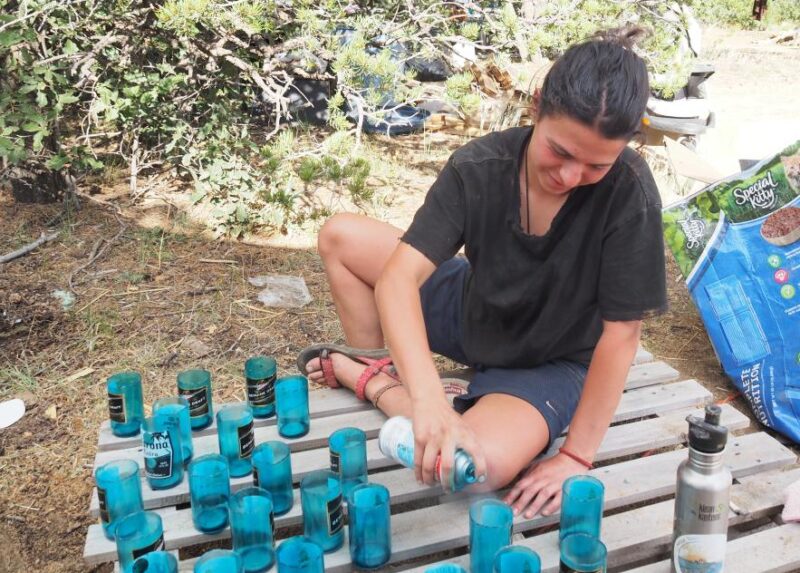
Sausanne preparing colored bottle bricks
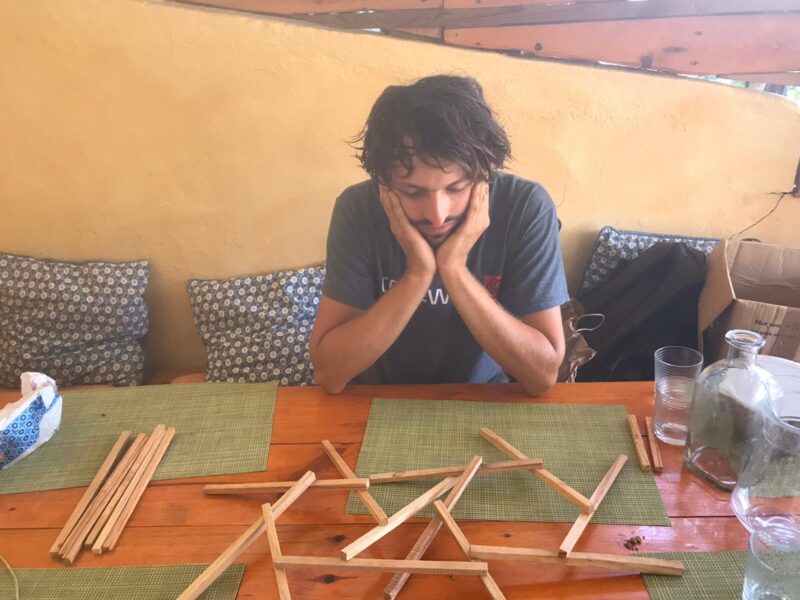
Rob planning a double reciprocal roof
Suggested Reading
WE LOOK FORWARD TO MEETING YOU!!!!
